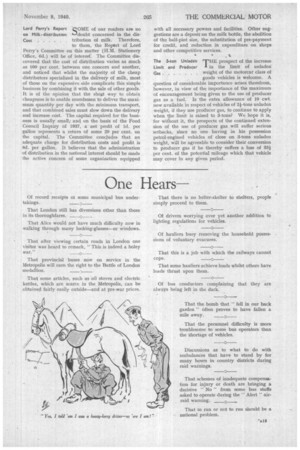One Hears
Page 17

If you've noticed an error in this article please click here to report it so we can fix it.
Of record receipts 01 some municipal bus undertakings.
That London still has diversions other than those in its thoroughfares.
That Alice would not have much difficulty now in walking through many looking-glasses—or windows.
That after viewing certain roads in London one visitor was heard to remark, "This is indeed a holey war."
That provincial buses now on service in the Metropolis will earn the right to the Battle of London medallion.
That some articles, such as oil stoves and electric. kettles, which are scarce in the Metropolis, can be obtained fairly easily outside—and at pre-war prices. That there is no helter-skelter to shelters, people simply proceed to them.
Of drivers worrying over yet another addition to lighting regulations for vehicles.
Of hauliers busy removing the household possessions of voluntary evacuees.
That this is a job with which the railways cannot cope. 0 That some hauliers achieve loads whilst others have loads thrust upon them.
Of bus conductors complaining that they are always being left in the dark.
That the bomb that "fell in our back garden " often proves to have fallen a mile away.
That the personnel difficulty is more troublesome to some bus operators than the shortage of vehicles.
Discussions as to what to do with ambulances that have to stand by for many hours in country districts during raid warnings.
That schemes of inadequate compensation for injury or death are bringing a decisive " No " from some bus staffs asked to operate during the " Alert" airraid warning.
That to run or not to run should be a national problem.




















































